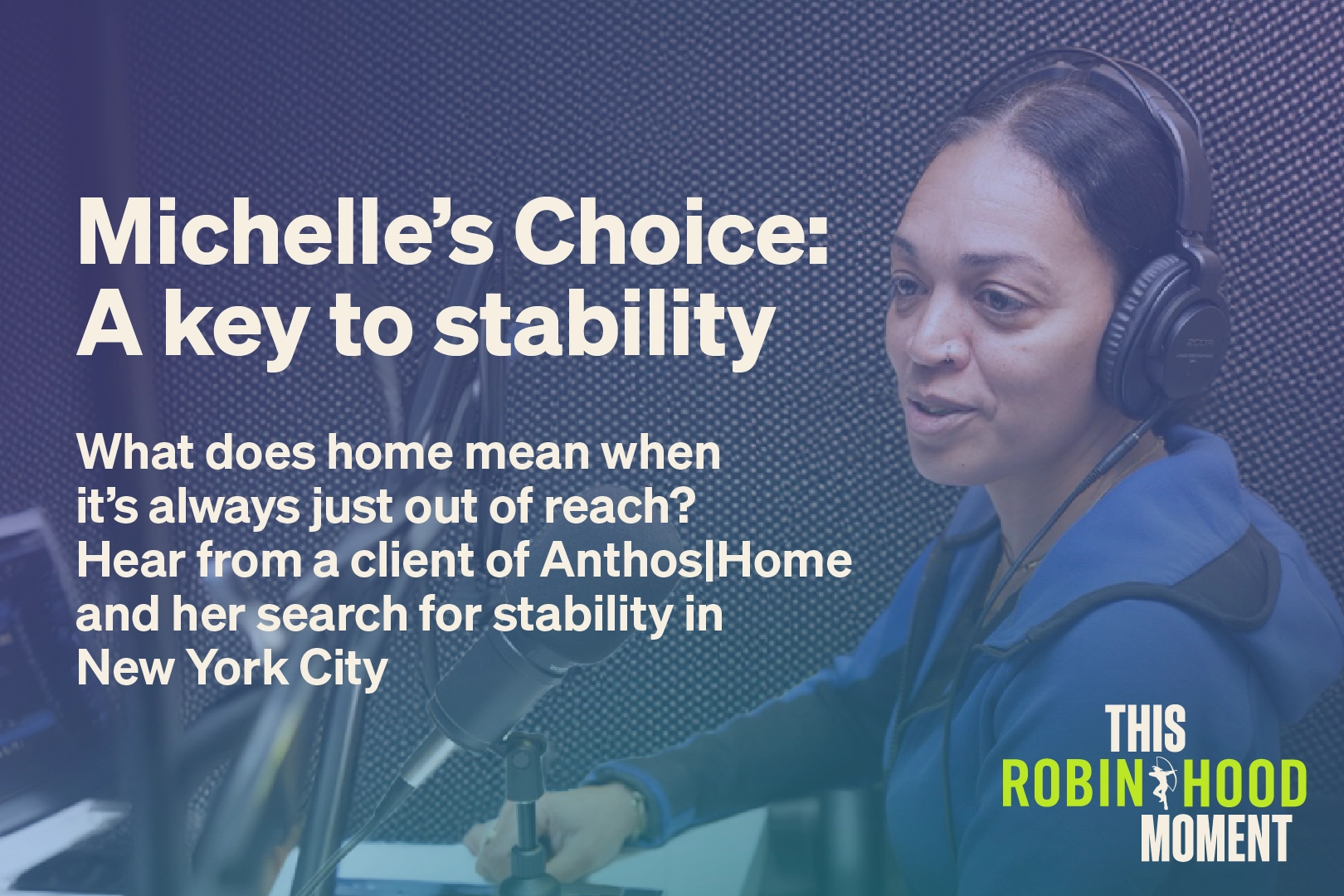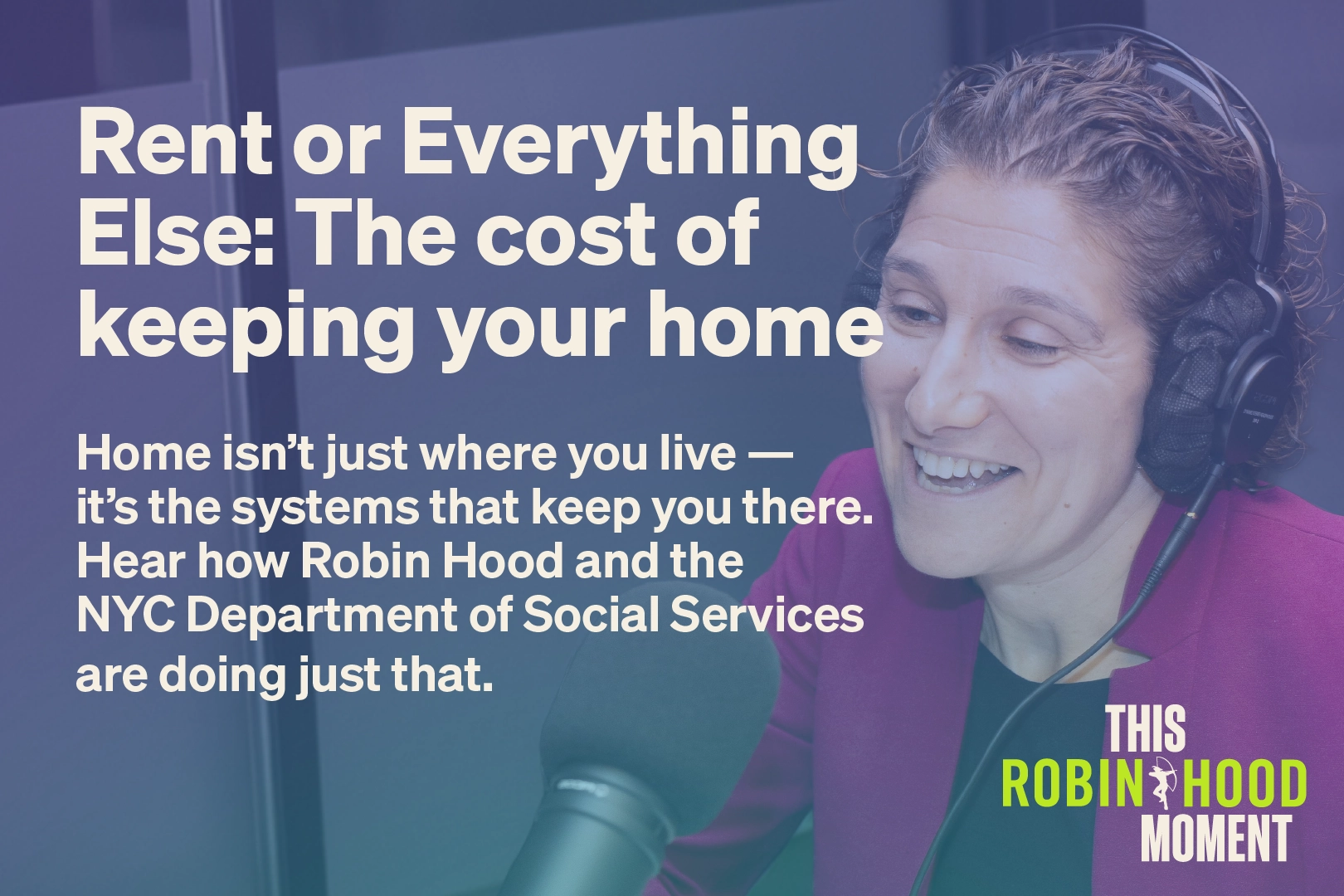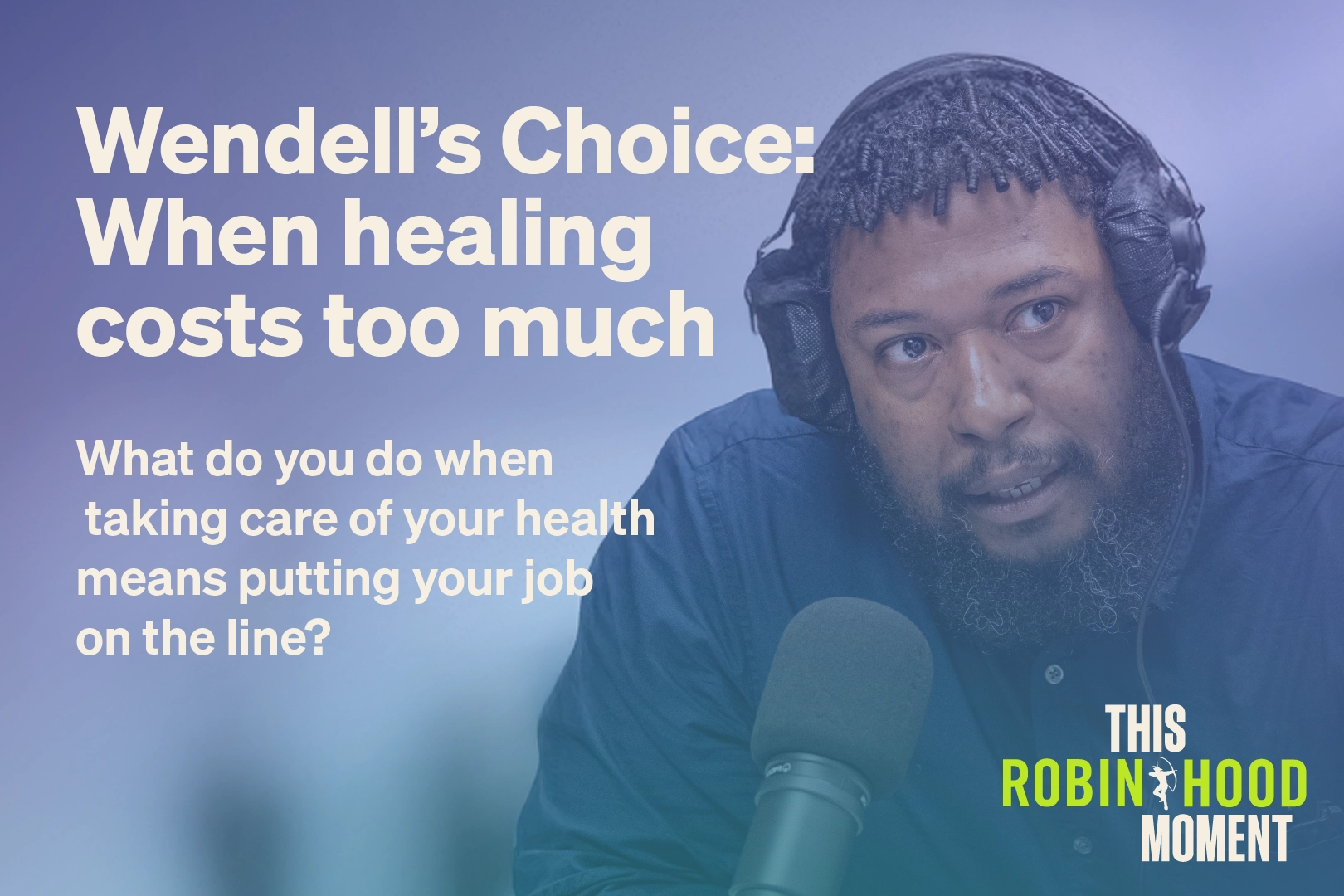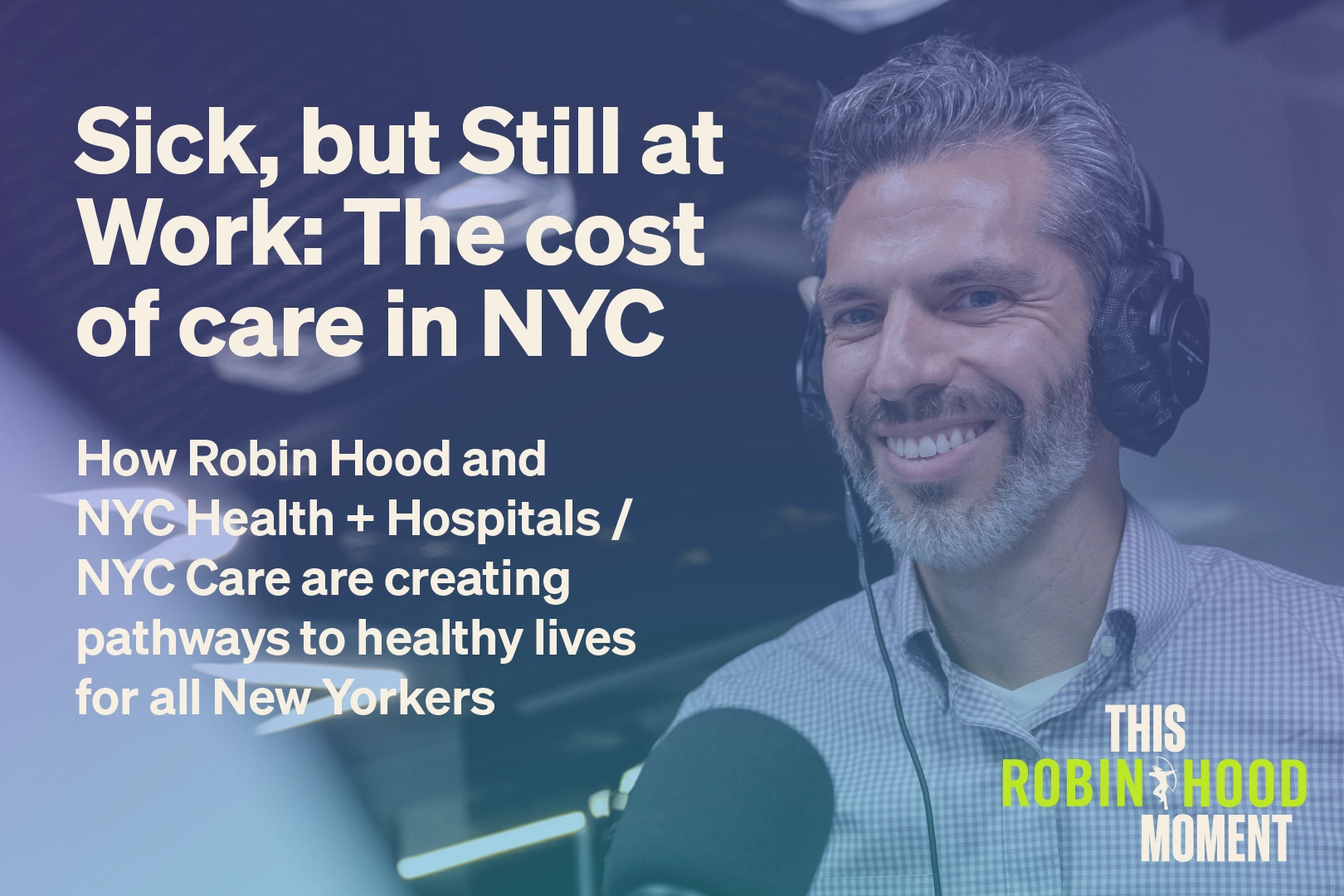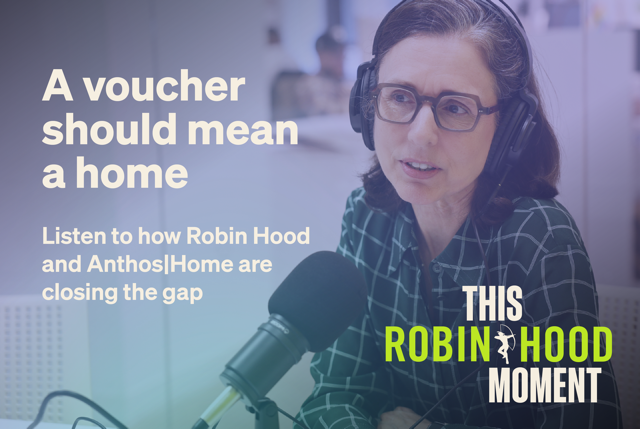Oct 23, 2025
Michelle’s Choice: A key to stability (Bonus Episode) | This Robin Hood Moment
What does home mean when it’s always just out of reach? For Michelle, a mother of three from the Lower East Side, every step toward stability came with a sacrifice—groceries or rent, childcare or work. Like two million New Yorkers spending more than 30% of their income on housing, she faced impossible tradeoffs until Anthos | Home, a Robin Hood partner, helped her turn a housing voucher into a permanent home. Her story shows that the fight for housing isn’t just about affordability—it’s about dignity and the chance to build a future.
Listen and Subscribe: Apple Podcasts | Spotify | iHeart | YouTube
What does home mean when it’s always just out of reach?
For Michelle, finding an apartment wasn’t just about having a roof over her head—it was about reclaiming a sense of security after years of uncertainty. With support from Anthos|Home, a Robin Hood-funded organization helping New Yorkers use housing vouchers to move quickly into affordable homes, Michelle finally found a place to settle and breathe.
In this episode, Michelle reflects on the emotional toll of searching for stability in one of the most expensive housing markets in the world, and what it means to finally hold the key to her own front door. Her story is a reminder that in New York City, the fight for housing is about more than rent—it’s about dignity, belonging, and the chance to build a future.
Thoughts? Guest suggestions? Email us at info@robinhood.org.
“This Robin Hood Moment” is hosted by Kevin Thompson and Crystal Cooper. The show is produced and edited by Cory Winter, with graphic design by Mary Power. Additional motion graphics and footage are provided by Motion Array. Our theme music is from Epidemic Sound.
The views and opinions expressed by external podcast speakers and guests are solely their own and do not reflect the opinions of Robin Hood or its personnel, nor does Robin Hood advocate or endorse any individuals or entities featured on the episodes.
TRANSCRIPT
This transcript was prepared by a transcription service. This version may not be in its final form and may be updated.
Cory Winter: What does home mean when it’s always just out of reach?
For Michelle, the answer changed every few years — each time a lease ended, a landlord sold a building, or a notice appeared on her door.
She’s a mom of three, born and raised on the Lower East Side — and like so many New Yorkers, she’s done the math that never adds up: rent or groceries, daycare or a shift at work, a roof or everything else.
Michelle: So that as far as jobs, you nitpick on what jobs you want because of that. If it’s certain hours where you know your child is going to be home and there’s nobody to watch them, you’re not going to want to take that job because I know I can’t afford the childcare. So who’s going to attend? So my kid, my child cannot be left unattended.
There’s so many things that could go wrong, I think. I think it comes to it when you nitpick with certain jobs because you don’t know what you’re going to take from. I don’t even think you leave time for yourself when you running around crazy doing all these, tending to children and trying to find a place to live and, you know, make sure that the schooling is right for the kids and making sure you have what you need in your home. You get to it when you get to it.
Cory Winter: That’s what we, at Robin Hood, call the cost of choice — the impossible tradeoffs poverty forces on people every day.
In a city where two million renters spend more than 30 percent of their income just to stay housed — and those in poverty spend nearly three-quarters — Michelle’s story isn’t an exception. It’s the rule.
She’s one of millions navigating an affordability crisis that defines life in New York — where a single rent bill can decide everything else: what you eat, where your child sleeps, how long you can hold on.
But for Michelle, that math finally changed when she connected with Anthos|Home — a Robin Hood-funded organization helping families use housing vouchers to move quickly into permanent homes. For the first time in years, she had a key to a door that stayed hers.
Cory Winter: From Robin Hood — New York City’s largest poverty-fighting philanthropy — this is This Robin Hood Moment. I’m Cory Winter.
In this episode, we follow Michelle’s story — a New Yorker navigating the cost of choice, and what it means to finally hold the key to her own home.
[MUSIC PLAYING]
Cory Winter: The first time you walk into PATH — the city’s intake center for families entering shelter — you’re not thinking about paint colors or natural light. You’re thinking about proof: that you were displaced, that you’ve got nowhere else to go.
Michelle: Okay, so when you go into what PATH, that’s the beginning of the shelter. When you go to PATH, it’s basically you telling them, I have nowhere to go. I was displaced, I was in a, a home that was going under foreclosure, so I was forced to leave.
Cory Winter: Michelle had been here before. Each stay meant starting over — new commute, new clinic, new school.
Michelle: But they place you depending on them. They try to keep you in the area of your children’s school even though they bused them. So I knew my son was in school in the Bronx. They kept me in the Bronx, but I wasn’t like three blocks from his school. I was a little 20 minute, maybe half an hour ride from the school.
So no, you have no choice on where they place you. They put you in any borough. They want they anywhere.
Cory Winter: That word — choice — comes up a lot in Michelle’s story. But for her, choice wasn’t freedom. It was survival.
Michelle: My normal day was taking my son to school, me going to work. And while I work on breaks, searching for an apartment. Those were my normal days. Coming home, picking on my child, going back to our shelter and doing it again the next day. It was very, very stressful. Very stressful.
Cory Winter: That’s how poverty narrows your world. The choices never stop — but none of them feel like options.
Michelle was offered one-bedrooms far too small for a growing boy.
Michelle: So I was looking on my own, is what it was. And I was having a really, really hard time because having a pre-teen and them offer me only one bedrooms and housing kind of though it’s awesome. They’re not spacious at all. So I’ve seen a few, and it’s not that I didn’t want them, is that I’m looking at them and I’m like, I have a 12-year-old and I’m going to have to sleep on a bunk bed.
I personally was not being picky. I was willing to take that one bedroom. Just give me a one bedroom space. You know, he is a preteen. He was 11 going on 12, and he was there boys. A boy to share a room with. His mom is like, you know, so something a little spacious where I know he would have his space and be comfortable. And I will have my space and be comfortable. That was my main goal.
Cory Winter: Her job at the hospital bounced between shifts — good pay, bad hours. She wanted something steady, but steady often pays less.
Michelle: I wanted something where at least a sensible time. Where I was home or in the hospital. Ping pong. Me? I could be 11 a.m. to 7 p.m.. I could be six in the morning to two. I could be, you know, 4 to 7. So my role was ping pong. That was not it was a good job, but it was not for me.
My son, like I said, is also 12. So in this day and age, I’m a realistic mom. The streets are swallowing up our babies. Okay, realistically, they really is. I’ll if I let it take my soul. So no.
Cory Winter: And that’s another cost of choice — choosing time with your child over the paycheck that keeps your home.
She was making choices no parent should have to make: between work and care, survival and safety.
So Michelle switched careers, becoming a paraprofessional with the Department of Education — predictable hours, less chaos, more stability.
That’s the cost of choice in New York City — when every decision has a price tag, and you’re the one paying it.
When Michelle’s shelter director saw her pushing hard — working, searching, parenting — she made a call.
Michelle: And then the director saw that, you know, I was working. I was doing my part. I was really, really trying. It’s not like I sat there all day and lived off of them. No, I got up in the morning. I was getting up at 430, you know, taking my son. So who he had to go to so I can go to work.
And so they, introduced me to Denise, and that’s who I started with. Yeah. Lovely person, lovely.
Cory Winter: Anthos | Home exists to make that next choice — the choice to stay, to settle, to rebuild — actually possible.
They do the work in between: helping families navigate the paperwork, persuading landlords, cutting through the red tape that too often turns a housing voucher into a dead end.
Michelle: I didn’t really know how CityFHEPS worked. I was new to that myself, so I thought if I didn’t find something in a certain amount of time, they would be like, well, she just don’t need this anymore, you know, and take it away from me. And then I’m like in my head, oh my God, just pick something because you don’t want to lose this.
This is right at the moment. This is the only help that’s available. There isn’t really no section eight. Nature’s weightless. Whoof. Oh, no. I’ve been on that since maybe 1998, and I still haven’t been called so Anthos one came in a little while after, but the. I’ve been through a few caseworkers when I was in the shelter as well, but that last one that I had, oh she was awesome.
Like she, she saw me push in so she pushed for me. If you understand, like I didn’t have to communicate with animals home as far as if it was an issue or she. I’ll find out for you. Go about your day. Go to your job. You know, don’t worry about it. I can help you.
Cory Winter: After years of waiting, one sound changed everything.
Michelle: I know what I’m waking up to and I know what I’m going to sleep. So in a sense, I don’t have to worry about if I get up tomorrow, are they going to try to change me to a different place? Because that’s possible. When you in the shelter, it’s possible. Okay, well, you’ve been here too long. Now we’re going to send you over here.
And so it’s just like, I know what I’m waking up to and I know what I’m going to sleep. So I’m going to sleep to my home, and I’m waking up in my home.
Cory Winter: Routine came back. So did rest.
Michelle: I cook daily, saves money. Outside food is very expensive.
Cory Winter: And that Christmas, for the first time in years, she bought a tree.
Michelle: Okay, Christmas I was able to put up a tree. I was able to decorate where we was at before we could even have a tree. You know this, we had limited space, so there was actually limit to what we was allowed to bring in. So having my own now was like, maybe you want a big tree, we could get a big tree. You want it to be real and not plastic. We can do that as well. So and I love Christmas. So that to me the holidays was the best. We put the tree up. We do, we do the, the baby stuff still we do the hot chocolate. We watched the movies. Yeah, we have the whole family over. Like that’s how you very family orientated, you know, exchange gifts. We did the little grab bag between us. So yeah, it was exciting.
Cory Winter: With a permanent home, Michelle could start looking forward.
Michelle: What I want to do with myself, that’s what I’m able to focus on. That’s why I said I’m good where I’m at and if I want to, I’m able to move up to be a sub teacher, maybe even a teacher, you know, because I’m stable. I know my son has a place to go. So if needed to be, you know, after school, I got to do something.
You can go home, lock them those. You be okay, boy. But is stability before that, I could have sent him anywhere on his own. I had, so I had to be there with it. So myself as growing.
Cory Winter: And that’s what the end of the cost of choice looks like — when every “either/or” finally becomes an “and.”
Her youngest daughter and granddaughter moved in briefly — shelter wasn’t working for them. Watching her mother’s persistence, her daughter enrolled in security classes and is now preparing to move into her own apartment.
Michelle: And because she knows she’s on her way into her apartment, she’s getting herself to where she needs to be. So I think is a positive impact on where children, if you show them you’re gonna end up in a positive position yourself, then it’s positive.
Cory Winter: This is how stability multiplies. One family finding footing, another following behind.
And when people say “just move somewhere cheaper,” Michelle knows that “cheaper” costs more than it seems — losing family support, transit, and safety nets that make survival possible.
Michelle: So moving somewhere where have nobody is going to cost me more at the end because now I need someone said sounds to him I need to figure out how to travel. I might end up needing a car where I’m at because there’s no public transportation, so that’s another cost right there. That means insurance, that means gas. That means, yeah.
Cory Winter: Housing assistance isn’t a handout. It’s the floor that keeps families from falling through.
In fact, Robin Hood’s Poverty Tracker shows that programs like Section 8 and CityFHEPS cut poverty among recipients from 55 percent to 37 percent — keeping 150,000 New Yorkers above the poverty line, and sparing another 140,000 from deep poverty.
That’s what’s at stake if these programs are cut — not numbers, but people like Michelle, for whom every choice already comes at a cost.
[MUSIC PLAYING]
Cory Winter: Ask Michelle what housing means, and she doesn’t hesitate.
Michelle: To me, housing matters. One is you have a lot of families who are broken up because they’re homeless. Like I say, adult children who once was in a home with their family is probably now somewhere who knows where this place stole. If they had somewhere to go from the beginning, they could have been together. So it’s just about family, keeping families together.
Cory Winter: She’s lived what most people never have to imagine — the uncertainty, the judgment, the strain. But also the relief that comes from a key that finally fits.
When Michelle locks her door each night, she’s not thinking about programs or statistics — she’s thinking about the ordinary things that stability allows. A meal she cooked. A safe bed for her son. The sound of laughter from the next room.
That’s what housing assistance makes possible — not luxury, but peace.
And behind every success story, like Michelle’s, are the people who make the system work: organizations like Anthos | Home, and city leaders working to ensure that families can not only find housing but keep it.
For Michelle, the difference is simple. She no longer measures life by what she can sacrifice. For the first time, her choices don’t cost her everything.
[MUSIC PLAYING]
Michelle’s story is one of thousands unfolding across New York City — families fighting to stay housed in a place they love, and the people working behind the scenes to make that possible.
If you want to understand the bigger picture — the systems that either open doors or keep them closed — listen next to “A Voucher Should Mean a Home.”
That episode follows Laura Lazarus, co-founder of Anthos|Home, the nonprofit that helped Michelle finally find her apartment.
Laura and her team are taking on one of the city’s toughest challenges: turning a housing voucher from a promise into a lease. You’ll hear how they’ve helped hundreds of families move from shelter into permanent homes — and what it takes to make that system work the way it should.
And then, step further upstream in “Rent or Everything Else: The Cost of Keeping Your Home.”
That episode explores what happens after a family finally gets their keys — and how the city is rebuilding the safety net so people can not only find housing but keep it. It’s a look inside the policies that shape lives like Michelle’s every single day.
Together, these stories paint a fuller picture of the cost of choice — what stability costs, who’s fighting to protect it, and how one key — in the right hands — can change everything.
[MUSIC PLAYING]
Cory Winter: I’m Cory Winter for This Robin Hood Moment — a podcast from Robin Hood, New York City’s largest local poverty-fighting philanthropy.
Thanks for listening, and for being part of the conversation.
[MUSIC PLAYING]
